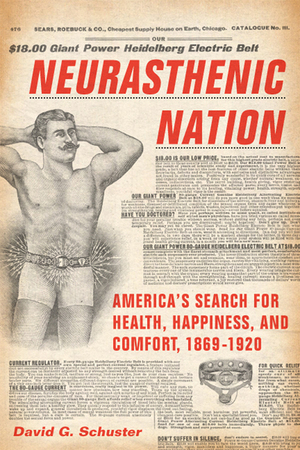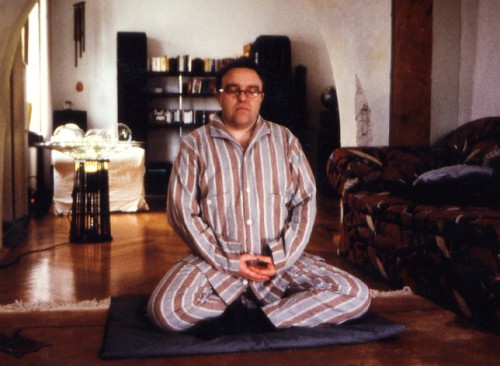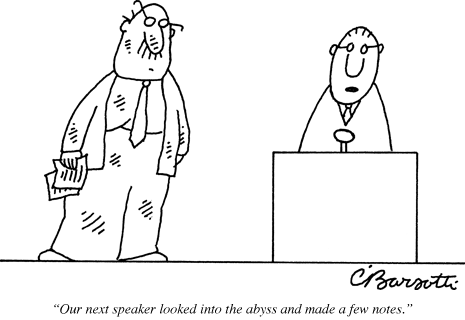
Well, we’re probably nearing our yearly limit for writing about anxiety, and it’s only January, but great articles on the subject have been irrepressible. I don’t think it’s a stretch to say that our increasing need to self-actualize, and increasing avenues for doing so, is a root behind the contemporary epidemic of nerves that had 1 in 5 American adults on anti-anxiety or antidepressant meds in 2011, numbers which have presumably risen since. An organization called the ADAA (anxiety and depression, etc) reported that almost one-third of the nation’s health bill is caused by anxiety disorders. You could reasonably ask to vet the numbers there, but even assuming exaggeration, it’s a lot.
 Theories abound. Alienation from the world, means of production, or old social structures are described by various thinkers, and those things probably don’t help. From a political theory perspective, you could talk about the undue weight placed on the individual, with liberal (minimalist) government as a vehicle only to secure the individual’s freedoms, his possibilities, his private little space to pursue happiness. Indeed, we can pursue it now like never before, and quoting one of our all-time favorite Atlantic articles, “Happiness as a byproduct of living your life is a great thing,” Barry Schwartz, a professor of social theory at Swarthmore College, told me. “But happiness as a goal is a recipe for disaster.”
Theories abound. Alienation from the world, means of production, or old social structures are described by various thinkers, and those things probably don’t help. From a political theory perspective, you could talk about the undue weight placed on the individual, with liberal (minimalist) government as a vehicle only to secure the individual’s freedoms, his possibilities, his private little space to pursue happiness. Indeed, we can pursue it now like never before, and quoting one of our all-time favorite Atlantic articles, “Happiness as a byproduct of living your life is a great thing,” Barry Schwartz, a professor of social theory at Swarthmore College, told me. “But happiness as a goal is a recipe for disaster.”
Happiness has always been a human goal, but our heightened degree of individual autonomy and possibilities – or in career-counseling parlance, “potential” – allows us to give ourselves more illusions about it than previously. That is to say, we have such a broad field of achievement open to us, we can tie our happiness to our degree of achievement. Thus the infinite regression of good university–>good graduate school—>good job—>tenure—>significant publishing—>household name four hundred years in the future Law for academics, or the promise of endless promotion for just about any career. To get theological for a moment, Gregory of Nyssa saw eternity as a continual growth into the Godhead: God is infinite, so our increase in blessedness will be infinite, too. That temporal plenitude now looks like now like an achievement one: there will always be more to achieve, so happiness from such achievement will always be possible.
Tying happiness to achievement – or to education, to the economy of experiences, or to virtue development; in short, to our control – is tempting at the outset, but what happens when we find ourselves unhappy? Cue The Chronicle of Higher Education, and its wonderful article from Mari Ruti:
Many of us have, in fact, internalized the ideal of a happy, balanced life to such an extent that we find it hard to imagine alternatives. As Freud has already claimed, there is little doubt about what most people want out of life: “They want to become happy and to remain so.”
A quick survey of our culture—particularly our self-help culture—confirms Freud’s observation. One could even say that, in our era, the idea that we should lead happy, balanced lives carries the force of an obligation: We are supposed to push aside our anxieties in order to enjoy our lives, attain peace of mind, and maximize our productivity. The cult of “positive thinking” even assures us that we can bring good things into our lives just by thinking about them.
In this picture, anxiety is somewhat of an embarrassment: a sign of existential failure. Although the rushed pace of contemporary life makes tranquillity more and more difficult to come by, we are repeatedly warned against the pitfalls of anxiety, including the psychosomatic symptoms it’s supposed to spawn. So-called wellness experts deem agitation to be bad for us. Magazine articles offer tips on how to overcome stress. And New Age gurus equate enlightenment with serenity.
All of this can make us feel so anxious about feeling anxious that when we catch ourselves getting a little stirred up, a little excited, even in a good way, we end up suppressing our feelings because we fear that our ardor might deliver us straight into the lair of … anxiety. In that sense, we are getting a general education in emotional numbness; essentially, we are taught to fear aliveness in all of its manifestations.
I would qualify that while her diagnosis of external pressures condemning us for existential failure is dead-on, the suppression doesn’t come from without, at least not to me. Rather, anxieties offer voices – maybe true, maybe not – which condemn us, accuse us of messing up somehow or holding the spectre of future failure (of whatever stripe) before our eyes. If we allowed those voices to resolve themselves, gave them time to breathe and speak rather than suppressing them, we may receive real absolution for our petty fears… or we may receive a definite condemnation for our well-founded ones. And, if Christianity’s view of man is at all to be trusted, we cannot accept a judgment that we are guilty, even if if it’s a necessary counterpart to absolution. Our need to distract comes directly from within. The fact that these distractions are more accessible in current times just means it’s easier to follow an inner impulse.
There are numerous forms of distraction – foremost in my mind is cell phones, because of Louis C.K.’s brilliant riff on Conan, but there are less surface-level ones, too. As anxiety comes from a wide field of possibilities, with many options and, therefore, much potential for failure, ideologies (on both sides of the left-right spectrum) offer a tight, easily-definable set of criteria for making decisions. They deliver the self over to a higher power, so we don’t have to face our “dizzying freedom” (Kierkegaard) directly. In this sense, any kind of moralism, secular or religious, can be the idol, something which makes God knowable by making life seem that way.
But the main distraction is the one stuck in a positive feedback loop with our culture’s particular manifestation of anxiety, and that distraction is achievement or self-improvement. In its least credible form, this looks like positive thinking; in its most credible, it looks like striving to become a better person, a more responsible agent. To decide when such striving is unhealthy, we could posit a criterion: whenever moral striving comes from an external standard, it is escapism, a palliative; when it comes from an internal desire, it’s more natural.
The distinction is a messy one, not least because the line separating our wills (what we want to do) and our ‘choices’, or possibilities, is thin and blurred. I really don’t know whether I want to read War and Peace, or if I just feel like I should. The ‘should’, after overexposure, clings so tightly to our wills that we can’t distinguish one from the other. That is, I want to have an identity as the kind of person who reads and enjoys War and Peace… so after a while, it may feel like I want to read the book itself. Confusion is everywhere present.
 Within the realm of morality, this means that books extolling the virtues, or providing a vision of the life well-lived for inspirational purposes is a distraction (like C.K’s cell phone), but perhaps more – not only does it distract, but also it may sabotage the will by conflating it with outward standards, with a higher degree of conflation, perhaps, the more affectively they’re pitched to us. Our real desires are now more difficult to discern, our identity less unified. But maybe another attempt at a criterion could be made: whenever I read a book thinking it will inspire me, whatever inspiration is there is likely to be short-term. The self-help industry, as well much of the pop theology industry, is, financially speaking, founded on that premise.
Within the realm of morality, this means that books extolling the virtues, or providing a vision of the life well-lived for inspirational purposes is a distraction (like C.K’s cell phone), but perhaps more – not only does it distract, but also it may sabotage the will by conflating it with outward standards, with a higher degree of conflation, perhaps, the more affectively they’re pitched to us. Our real desires are now more difficult to discern, our identity less unified. But maybe another attempt at a criterion could be made: whenever I read a book thinking it will inspire me, whatever inspiration is there is likely to be short-term. The self-help industry, as well much of the pop theology industry, is, financially speaking, founded on that premise.
Of course, from a Christian perspective, the Holy Spirit may well choose to work in and through these things, even self-help religion. But to say such a working is guaranteed, or even strictly probable, is to bring even God’s word into the realm of human control and predictability, a realm in which absurdities begin to multiply. Instead, again following Ruti’s lead, there’s another alternative:
I suspect that beneath our society’s desperate attempts to minimize risk, and to prescribe happiness as an all-purpose antidote to our woes, there resides a wretched impotence in the face of the intrinsically insecure nature of human existence. As a society, we have arguably lost the capacity to cope with this insecurity; we don’t know how to welcome it into the current of our lives. We keep trying to brush it under the rug because we have lost track of the various ways in which our lives are not meant to be completely healthy and well adjusted.
Omit the word “meant”, or at least give it some context, and you land squarely in a Christian argument for repentance, and one fortunately situated within the context of anxiety. The phrase “wretched impotence” almost sounds stylistically like KJV or an early Calvin translation. But I think the note she hits is that failure to achieve happiness, or virtue, or even faith cannot be addressed by redoubling our attempts. Whether the law be happiness of financial success or virtue development or Facebook likes, we focus on our goals, or the “should” in our lives, which can be an easy distraction from the messy “is” lurking beneath, questioning our attachment to the “ought” by chipping away at us, whispering the reality we emotionally crowd out with the “ought”s. This voice is the voice of one particular kind of anxiety – the well-founded one – and allowing it to speak is nothing short of repentance, which, in its historical definition, implies recognition of sin and regret of it, but little in the way of forward-looking behavioral resolve (Greek metanoia, “after-thought”).
The ought is consolation, but only in the short run; theologically, Christianity would say that Christ came to address the “is” – “where is your husband” or “give all to the poor”. In moralizing, we step past this uncomfortable phase. But it’s only in addressing those voices of conscience that they may be silenced; in theological terms, felt to be absolved. Experiencing this absolution (on the emotional level) necessarily implies being deconstructed first. Religions or denominations which thunder this deconstruction in people’s ears may be distracting themselves (Mt 7:3). Which is why grace not only follows this deconstruction, but often precedes it as well.
My favorite poem, for now at least, George Herbert’s “Love (III)”, involves an interaction in which one person, a guest at a dinner, feels unworthy and therefore refuses the invitation, then tries to look away to distract himself, and finally tries to serve to earn his place. As the focus narrows, he first agrees to be present with his host, then to look at him, and finally to join – with grace compelling him at every step:
Love bade me welcome, yet my soul drew back,
Guilty of dust and sin.
But quick-ey’d Love, observing me grow slack
From my first entrance in,
Drew nearer to me, sweetly questioning
If I lack’d anything.“A guest,” I answer’d, “worthy to be here”;
Love said, “You shall be he.”
“I, the unkind, the ungrateful? ah my dear,
I cannot look on thee.”
Love took my hand and smiling did reply,
“Who made the eyes but I?”“Truth, Lord, but I have marr’d them; let my shame
Go where it doth deserve.”
“And know you not,” says Love, “who bore the blame?”
“My dear, then I will serve.”
“You must sit down,” says Love, “and taste my meat.”
So I did sit and eat.

COMMENTS
Leave a Reply














